Why Solving Jigsaw Puzzles Is Good For You
Stay extra focused while reading today’s blog post. It’s very important! Collect all the thoughts expressed in the text and try to piece them together into one coherent and logical picture of the problem. What you’ll get is the result of your hard, intellectual work! Once the intensity of the stimuli in your brain starts to normalize, you will discover the heart of the matter—the answer to why solving jigsaw puzzles is such a valuable activity.
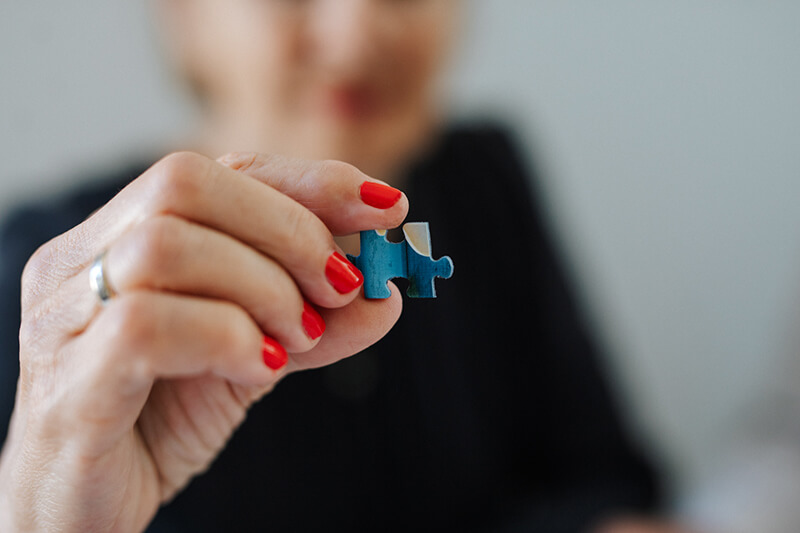
You Might Be Thinking…
…that doing puzzles is boring and tedious, and that the whole idea is rather trivial — you sit over a jumble of haphazardly scattered pieces of small size and complex shapes, and the only goal is to put them together. The more pieces to assemble, the more likely you will feel overwhelmed by the thought of having to put so much effort into achieving your goal…
Admittedly, solving jigsaw puzzles can be a difficult task, which does require some motivation and perseverance. However, we want to draw your attention to some facts that you may not be aware of when you set about putting together your puzzle images. Stay alert now and read on—below we have compiled the most important arguments for why doing jigsaw puzzles is good for you! Here are, in our opinion, the major advantages:
Concentration, Perceptiveness, and Visual Memory
A puzzle box is filled with a multitude of small pieces which help you systematically exercise your visual memory and improve your perceptiveness and concentration. You search for and try to put together elements of different colors and shapes. Such an activity requires the involvement of both hemispheres of the human brain. This makes it an excellent exercise to keep your central nervous system at full capacity.
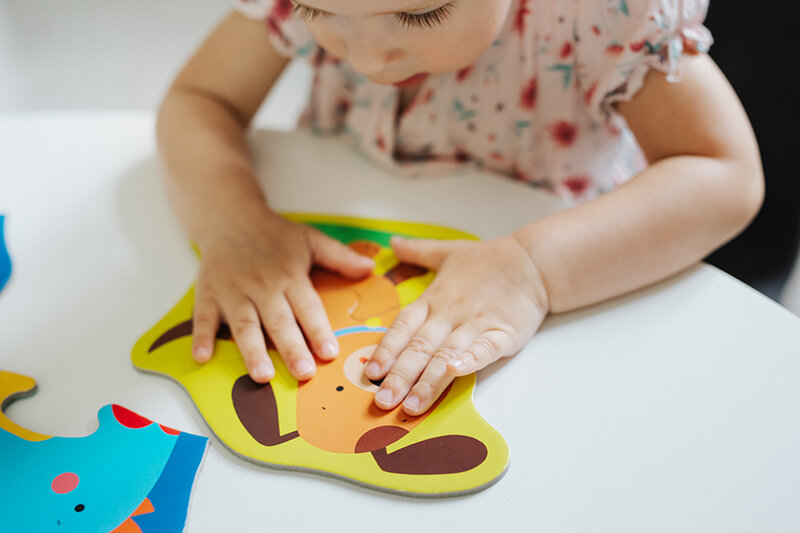
Manual Skills and Creativity
While completing a puzzle, your hands come into contact with lots of small elements, which helps you systematically practice accurate grip. By doing so, you develop manual skills. In addition, solving jigsaw puzzles encourages ingenuity and the development of a creative mindset. Doing puzzles is also great practice for your imagination and artistic sense. This will become especially apparent when you watch the progress of your little ones, who will get more and more skillful and imaginative as they grow.
Mathematical Skills
While this may not be obvious at first glance, solving jigsaw puzzles helps develop mathematical skills. How is this possible? Well, assembling jigsaw puzzles promotes the development of analytical skills, as well as spatial perception. Besides, putting together puzzle pieces encourages logical thinking, associating facts, and identifying cause-and-effect relationships. All this makes jigsaw puzzles a real mathematical challenge for your mind!
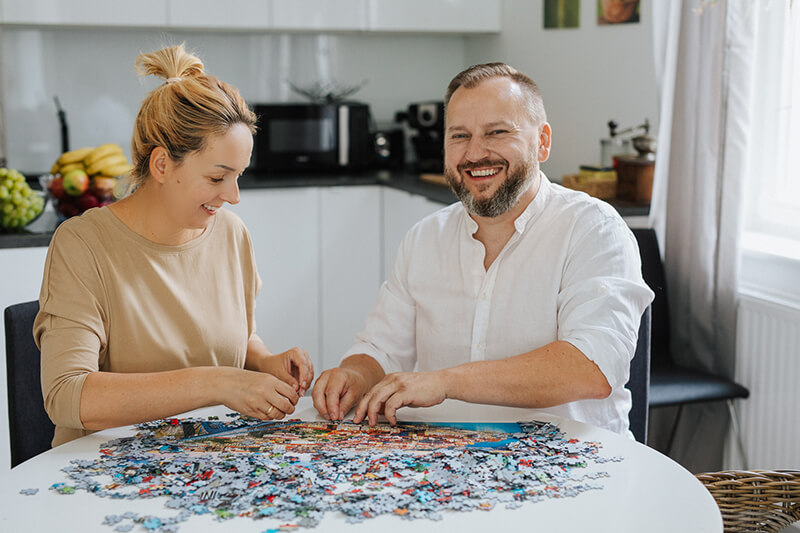
Better Sense of Well-Being
If you want to be fit as a fiddle, you need to know that solving jigsaw puzzles helps to improve your overall health. But how can puzzles influence our well-being? By focusing your attention on a single goal you help to even out your breathing rate, lower your blood pressure, and make your heart beat in a steady rhythm. This improves your perceived health and gives you a greater sense of well-being on a daily basis.
Team Work
Completing jigsaw puzzles doesn’t always have to be a solo activity. Why not team up with your friends or family and have fun together? The larger the puzzle set you choose, the more opportunities for group collaboration it will give you. Doing puzzles supports you in improving soft skills and social competencies such as teamwork and interpersonal communication. So don’t hesitate and enjoy your team practice—who knows, perhaps solving jigsaw puzzles will one day become an Olympic sport?
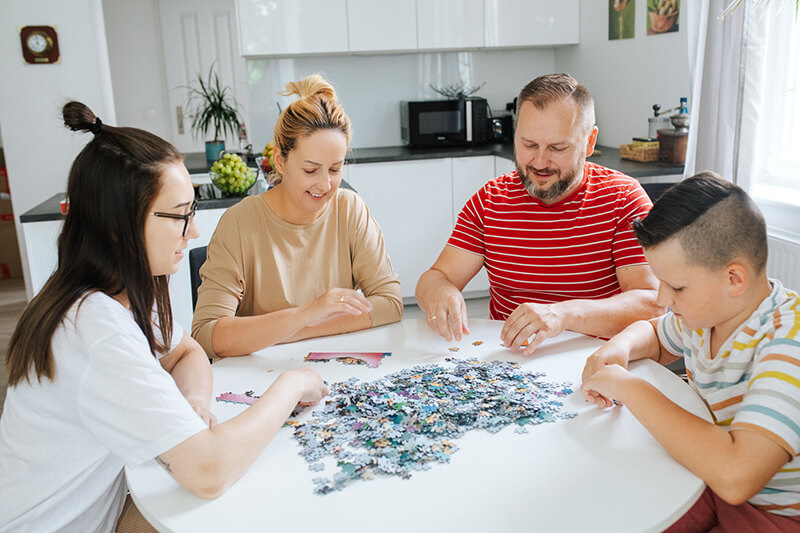
Multitasking
A passion for puzzles can easily be combined with other activities, including those with educational value. For example, while assembling your picture, you can listen to interesting podcasts or inspirational audiobooks. Have fun and learn at the same time! Of course, it all depends on whether you can divide your attention into several streams of consciousness without compromising any of the tasks. If, however, doing more than one thing at the same time seems too difficult, concentrate solely on achieving a psychological state of flow by solving your puzzle.
The World of Emotions
Solving jigsaw puzzles also helps us develop emotionally. Putting together the pieces of a puzzle can be a source of joy and pride in successfully completing a project as well as satisfaction in tackling a challenge. Trust us—emotions are what makes life worth living! When you look at the final result of your work and feel pleased with the outcome, you begin to appreciate yourself more, and this makes you feel valued, fulfilled, and motivated.
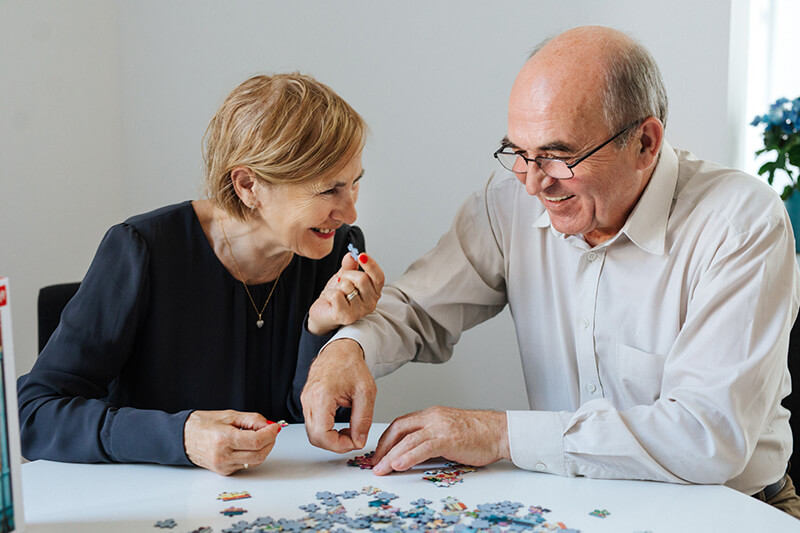
Perception of the World
Jigsaw puzzles can change the way we see reality. They help you look at things from the perspective of their small component parts—tiny pieces with no holistic context, appearing to be something other than they really are. After some time, it turns out that putting them together makes sense—by assembling individual elements you gradually get a bigger picture. As a result, you start looking at the problem from a completely different perspective—a tiny little thing, which seems so small and insignificant, when linked with other elements, becomes an essential part of the full image. Puzzles are not unlike human dilemmas—to understand the true nature of the problem, you have to look at its individual components. Only after you put together all the little bits and pieces will you get the full picture of what the issue is all about. Solve lots of jigsaw puzzles and enjoy your new perception of the world!



